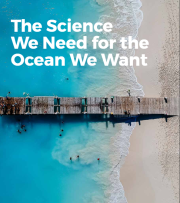On 8 November 2019, Shanghai, China, a three-day WESTPAC Scientific Symposium and Workshop were concluded with a collective action plan for the next year, with a view to furthering research and monitoring of marine microplastics and plastics in Asia and the Pacific. The two WESTPAC events were co-organized and supported by the Plastic Marine Debris Research Center, East China Normal University (ECNU) of China, the host institution of the Regional Training and Research Center (RTRC) on Marine Plastic Debris and Microplastics.
The two events were planned as an essential activity driving the implementation of the Sub-Commission’s marine microplastic research and monitoring programme. More than 50 experts from 11 countries participated in the two events. The first day’s scientific symposium saw the latest research findings, marking great progress of the WESTPAC scientific communities and demonstrating the value of WESTPAC in initiating the network in microplastic research and monitoring.
Plastic and microplastic pollution have been at the top agenda of a number of bilateral and multilateral agreements and frameworks. In preparation for the UN Ocean Science Decade for Sustainable Development (2021-2030), the recent Global Planning Meeting (13-15 May 2019, Copenhagen, Denmark), and Regional Planning Workshop for the North Pacific and Western Pacific Marginal Seas (31 July-2 August 2019, Tokyo, Japan) also emphasized the urgency to intensify efforts in researching on the source, transport and impact of marine plastics and microplastics.
The findings presented at the Symposium exhibited a broad range of ongoing research activities on marine microplastics in the region. A high correlation between microplastic abundance and the trophic level was revealed through a research looking into the microplastics in different marine organisms. Plenty of field work was conducted on the transport of microplastics from river and atmosphere to the ocean, showing microplastic is ubiquitous in marine environment, such as beach, water column, zooplankton, corals, coastal areas and even in the Polar regions. An experimental study further provided a hint as to how buoyant microplastics dissolved into organic carbon through sunlight driven photochemical process. A recent field survey brought attention to the hadal trenches, which look like major depositories for plastic wastes in the ocean. Ocean modelling was also introduced and demonstrated as a useful tool studying the distribution, transport of plastics and microplastics in the coastal and open oceans. Expert from Bangladesh presented the first scientific finding on microplastic in the Bay of Bengal, which was published owing to the knowledge transfer via the WESTPAC established research network.
Followed by the 3rd WESTPAC workshop, participants reported on the progress made since the last workshop in late 2018, particularly in these pilot sites monitoring microplastics in beach sediments based on the WESTPAC harmonized method. It was quite encouraging that a lot of field work has been conducted or ongoing with results collected or published. In-depth discussions were aroused about harmonized standard methods for sampling and laboratory analysis of micro-plastics in water column and marine organisms (such as fish, zooplankton, mussels, corals), including their technical and infrastructure requirements, monitoring methods and their pros and cons. Participants also considered the need for a comparative study on the river flux of marine plastic litters and micro-plastics in the region, and decided to form an open-ended working group for further deliberations. More, in order to enhance national and regional capacity for microplastic research and monitoring, the Regional Training and Research Center, hosted in ECNU, will develop and conduct professional hands-on trainings in 2020 for early career scientists from participating institutions and countries.
The IOC Sub-Commission for the Western Pacific (WESTPAC) established at its 11th Intergovernmental Session (21-23 April 2017, Qingdao, China), a programme that aims to establish a marine microplastic monitoring and research network; and to develop joint-monitoring and research activities in order to understand the sources, distribution, fate and effects of marine microplastics in the Western Pacific and its adjacent regions.
Two regional workshops were held, respectively on 20-22 September 2017 in Phuket, Thailand, and 15-17 October 2018 in Shanghai, China, with the participation of more than 50 experts from Bangladesh, China, Indonesia, Japan, Republic of Korea, Malaysia, Singapore, Sri Lanka, Thailand, the Philippines, and Vietnam. Participants at the two workshops shared the latest knowledge on plastic and microplastic pollution at global, regional and local level, and examined existing methods and protocols for sampling and laboratory analysis of MPs in the marine environment. Participants agreed to develop harmonized Standard Operating Procedures (SOPs) in the region for sampling and analysis for MPs in beach, water column and marine biota. As an initial step, a set of harmonized SOPs for sampling and analysis for MPs were finalized, and more than 50 sites (beach) were proposed by participants with samples taken over the intersessional periods.
WESTPAC would like to extend its sincerest appreciation to the East China Normal University and its Plastic Marine Debris Research Center, State Key Laboratory for Estuarine and Coastal Research for their continued support for the workshop, and their commitment to enhancing research capacities of developing countries for sustainable development of ocean, marine and coastal resources.




